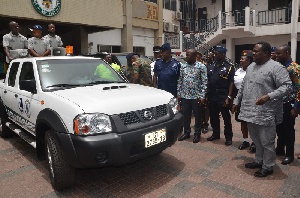The Accra Metropolitan Assembly (AMA) on Tuesday inaugurated and deployed sanitation taskforce officers to enforce sanitation by-laws on the streets, communities and in all homes in Accra.
The taskforce comprised metro guards from the AMA, police, fire and environmental health officers who are acquainted with the sanitation laws and it forms part of efforts to make Accra the cleanest city in line with the president’s vision.
Their work would be no different from the previous sanitation officers usually referred to as Town Councils or ‘nsamasama’ in the local dialect.
The sanitation taskforce is expected to work day and night and arrest and prosecute people who throw refuse indiscriminately on the streets, in their communities and people who have no dustbins in their homes.
The Mayor of Accra, Mohammed Adjei Sowah, who inaugurated the taskforce in Accra, said anyone caught dumping water sachets or any kind of rubbish on the streets carelessly would be picked instantly for prosecution.
“If you buy sachet water and you empty it, you don’t have any right to throw it onto the street, it is completely unacceptable to dump it anyhow on the street,” he said.
He said people who sell by the roadside and have no refuse bins, or loiter and do not clean where they sell would also be dealt with.
He said making Accra the cleanest city started in three phases, first with public education and collection of refuse in all parts of Accra and has now reached the law enforcement stage.
The exercise he believed would help ensure that refuses are properly handled and dumped in all parts of Accra and in every home.
Mr Sowah said city dwellers must understand that the AMA’s enforcement drive had no political colour and would be enforced to the latter, as the sanitation issues in Accra was mainly an attitudinal problem.
General News of Sunday, 8 April 2018
Source: ghanaiantimes.com.gh













